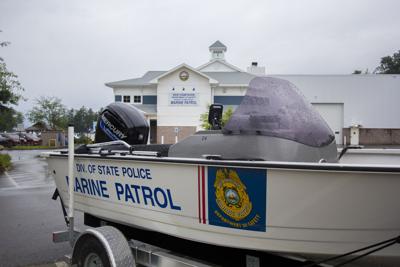GILFORD — Marine Patrol is looking for a few more officers out on the water. Hiring requirements, seasonal schedules and training commitments are proving to be hurdles.
“At our peak we had 100 [officers] statewide. We are well below that at this point,” said Marine Patrol Lt. Crystal McLain. She couldn’t offer exact numbers, but said there were less than 60 as of this month. McLain said there are currently a number of vacancies for the Marine Patrol officer trainee position.
“That's our seasonal position, where they come work for us during the boating season, and they have other lives the rest of the year,” McLain said. “We also have two full-time marine patrol officer II positions, those work year-round.”
Until a recruit reaches the officer II position, they are still part time, which poses a challenge when it comes to attracting long-term staff. However, McLain is living proof that it is possible.
“I started part time in 1998 as a Marine Patrol officer trainee and worked my way up through the ranks and became full time in 2002,” McLain said.
As for the part-time positions, McLain said a wide array of folks go for the job, from college students to retirees and everyone in between.
“It's a great avenue for teachers to work for us, because they're usually off in the summer time,” McLain added.
Teachers and students are often unable to commit to the entire boating season, which lasts for approximately six months. The start and end dates of that season also vary from year to year, making planning around other positions and responsibilities that much more difficult.
“It is very challenging because of the seasonality,” McLain acknowledged. “Because of the magnitude of training involved to get somebody through the hiring process and prepared for their initial summer, we do have a lot of training that we throw at them in a very short amount of time. We need them to be available for us in the winter and spring months.”
The process of becoming an officer starts with a job interview, a written exam, a physical agility test, a thorough background check, as well as physical and psychological examinations.
“Once an applicant has been selected and hired, they go through the part-time police academy for the Marine Patrol officer trainee position. And then before or after the police academy, they'll also attend Marine Patrol training, [a] mix of maritime classroom training and a mix of hands-on practical training.”
Recruits are paid during the training period. As of this writing, hourly rate for a trainee is $23.46 an hour.
During the summer, they can work up 40 hours per week.
For those able to arrange and schedule their lives around the position, it can be rewarding.
Marine Patrol is a division of the State Police, meaning requirements are a step above a standard police officer. However, McLain said Marine Patrol is able to pull from a select pool of qualified state troopers to help fill coverage gaps as part of a joint enforcement team, but even then the agency is selective with who they pick.
“The area of concern by doing that with too many people is that you're going to lose roadway coverage,” McLain said of the joint enforcement team. “It's that balancing act of what can we do to maintain coverage statewide.”
During her more than 20 years of service, McLain noted a significant dip in recruitment around 2010.
“The state as a whole at that point was facing some serious budgeting issues,” McLain recalled. “Prior to that, we would hire roughly 30 to probably 50 officers each year or year and a half for part-time. We'd have class in the winter and spring to get them prepped.”
Since then, McLain says the agency has yet to rebound from that budgetary squeeze. Another difficulty has been the yearslong journey of part-time labor to finally attain a full-time role, but that is something that may have to change in the near feature.
“Typically it's been a couple of years before making that transition from part time to full-time,” McLain said. “We are currently evaluating, do we keep that consistent? Or based on the limited number of applicants we've had in the past couple cycles for the full-time position, do we open that up to less of the maritime specific requirements, but maybe more of the law enforcement level? Looking at people who've worked the road for a couple of years or some of those types of standards and qualifications.”
Those interested in taking on the job can learn more at https://tinyurl.com/2n6m66jk.


















(0) comments
Welcome to the discussion.
Log In
Keep it Clean. Please avoid obscene, vulgar, lewd, racist or sexually-oriented language.
PLEASE TURN OFF YOUR CAPS LOCK.
Don't Threaten. Threats of harming another person will not be tolerated.
Be Truthful. Don't knowingly lie about anyone or anything.
Be Nice. No racism, sexism or any sort of -ism that is degrading to another person.
Be Proactive. Use the 'Report' link on each comment to let us know of abusive posts.
Share with Us. We'd love to hear eyewitness accounts, the history behind an article.